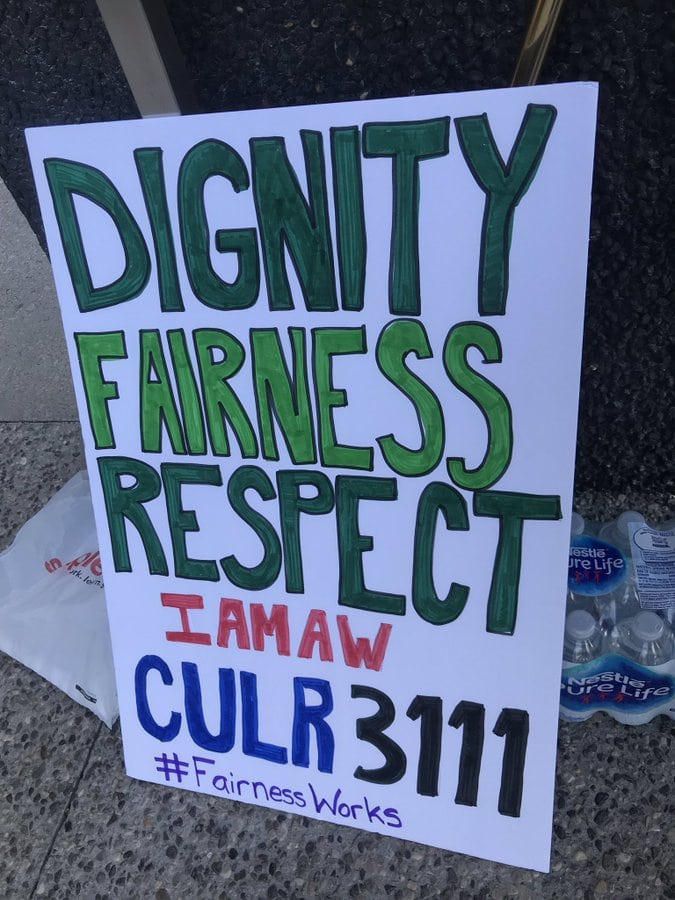
A lot of people don’t realize that unions that represent workers in interactions with employers are also employers themselves. The union’s leaders are members of the union and are elected by the other members – but most unions, especially larger national or international unions and labour federations, also have administrative, executive, and staff employees. These employees keep the union running day to day, and might have special expertise, like researching or negotiating, that the union can use during its organizing campaigns or collective bargaining.
What a lot of people also don’t realize is that employees of unions are often unionized themselves. The employees don’t belong to the same union that they work for – that would be a conflict of interest. So they are members of a different union, usually one that includes workers in similar occupations. As an example, the employees of the union I belong to, at a provincially-funded university, are members of a local of the Canadian Union of Public Employees, a national union that represents many public sector workers.
A union’s employees being unionized also means that, like any other group of unionized workers, they negotiate with their employer for a collective agreement. And that is where things can get kind of tricky. A union is accountable to its members, whose union dues are the union’s main source of revenue, and members expect their union to be financially responsible and to operate efficiently and effectively. But unions are also supposed to be progressive organizations that support better workplace conditions and fair treatment for all workers.
So it looks embarrassing for a union if contract negotiations with its own workers break down, and those workers decide to go on strike. And right now, 46 of the unionized workers at the Canadian Labour Congress (CLC), Canada’s largest national federation of unions, are on strike. These workers are members of the Canadian Union of Labour Representatives, which is affiliated with the International Association of Machinists and Aerospace Workers (IAMAW).
I don’t have any special insight on the dynamics of this bargaining dispute, or on what internal conflicts might be influencing it. CLC president Hassan Yusseff claims that after mediation, the union walked away from a “fair and decent offer” that members of the other union representing CLC workers had already agreed to. Apparently the disputed issues between this union and the CLC include the amount of pension contributions and the structure of an anti-harassment workplace policy.
The CLC has a special status as “the national voice of Canada’s labour movement”. Therefore, its operations should set an example for the thousands of unions and labour councils under its umbrella. It’s unfortunate that negotiations broke down between the CLC and this group employees, and it’s unfortunate that those employees felt that going on strike was their best option. Trust me, going on strike is not fun, and union members usually think very seriously before agreeing to a strike. There’s no way of knowing how long a strike could last, or how much the strike might hurt the workers financially in lost wages.
The CLC has a responsibility to treat its employees fairly, as does any employer, and its operations need to be financially sustainable. But as the organization that represents Canada’s labour movement nationally and internationally, the CLC also has a moral and ethical responsibility to demonstrate progressive and collaborative labour relations – to use an old cliché, to talk the talk and walk the walk. I sincerely hope that this dispute will be resolved quickly and amicably.
Originally published on Dr. Fiona McQuarrie’s All About Work, an always interesting Canadian blog about current events and issues in the world of work and organizations. Used by permission.
With a special thanks to our generous donors who make publication of the Nova Scotia Advocate possible.
Subscribe to the Nova Scotia Advocate weekly digest and never miss an article again. It’s free!




I want to say thank you for that lesson in Occupational Health and Safety. I’m a practicing champion in this field and everyone who is employed should open up their minds to understand what you just had conveyed. Unions don’t have the expertise or the education to protect workers, period. They are only interested in wage negotiations. This is how they make money off the backs of the most valuable in the workforce. Dalhousie University’s Facilities management does have a safety adviser, but he is in place only to protects the tradesmen, while custodial servicemen and women make up the majority of the collective. They then are racially profiled as in most cases, neglected by the union, singled out (profiled) by the employer given the industry, then subjected to unfair and unwanted treatment (bullied, harassed) as a means to intimidated all the while being neglected by their union when coming forward with such legitimate grievance (complaint). A safety advisor is supposed to be in the workplace and ensure all workers are treated the same and due diligence is preformed during the investigation of all workplace incidents. This is a strict practice that has extreme consequences under the “Act”. Union are playing games with peoples lives and there is no consequence for what they do. That’s how they strive in the system (labour force). Shameful and yes, something has to be done (changed) in order for us to all be treated as equals,(inclusion). Or change the policy to reflect a lack there of. There’s a game of systemic under-minding. In the black community, we are faced with this everyday, (discrimination) in all its manifestations. Just plain ignorance. Every workplace should have a safety advisor who protects all workers. If unions main interest is money, then I guess they can still negotiate wages, but not lives. It just takes some serious thinking.